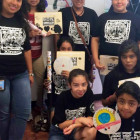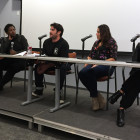
Creating a More Equitable and Effective Juvenile Justice System
|
We know that young offenders are different from adults and that incarcerating them perpetuates cycles of trauma and inequality that do us all more harm than good.
Juvenile Justice Information Exchange (https://jjie.org/tag/juvenile-justice/page/17/)

We know that young offenders are different from adults and that incarcerating them perpetuates cycles of trauma and inequality that do us all more harm than good.

The program, in place at more than 200 Philadelphia schools since 2014, is an alternative to the zero tolerance approach to school safety that has resulted in more arrests but not a decrease in behavioral incidents.

We have a pressing discipline problem that begins in classrooms and for far too many children ends in prison.

We sometimes skip class, talk back to teachers and experiment with marijuana. I was shocked to learn that in some areas of the United States teens are arrested and detained for these minor offenses.
Juvenile justice reform organizations fail to recognize the power of empathy between kids. There are a lot of us — 41 million — and we can make a difference.

Seven organizations will have a chance to further their efforts to help girls in the justice system thanks to more than $650,000 in funding from the National Girls Initiative.

She was 11 and in the sixth grade when she went to jail, eventually landing in solitary confinement. Nicole never imagined a petty fight at her Louisiana middle school would lead to years behind bars.

I sat in the back of the courtroom, waiting for my case to be called, and internally rolled my eyes over the attorney at the defense counsel table, a notoriously unprepared lawyer.

A youth justice advocate's childhood encounter with a violent police officer is told via a virtual world machinima, which is a method of making animated film using software similar to that for video games.

We prohibit young people from engaging in a whole host of things because we feel they lack the maturity to fully grasp the potential consequences of their actions. In spite of this, we support the idea that an adolescent who commits a violent act has somehow overcome the well-known cognitive and behavioral limitations of their age and should now, in the eyes of the court, be seen as an adult.

October is Youth Justice Awareness Month, and as consensus builds in the Senate and the House around the need for criminal justice reform, the effort to reauthorize the Juvenile Justice and Delinquency Prevention Act (JJDPA) is gaining momentum.